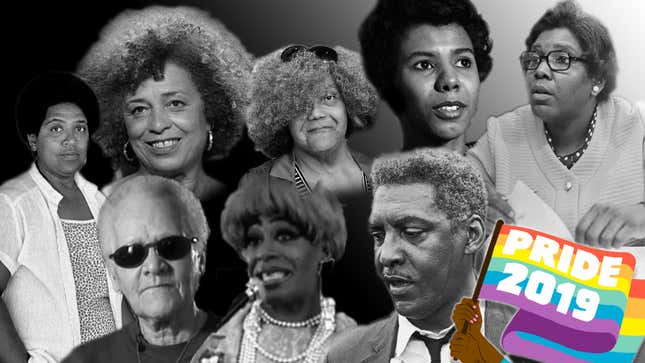
LGBTQ African Americans have always been here. (Drag) Kings and Queens, dykes, homos, gender nonconforming, same-gender loving, queer and trans folk populate our history and have been foundational to every single emancipatory movement we’ve ever had. But often, they are erased for their sexuality or their gender.
Gay folx been here. And they’ve been doing this work. So, for those we do know—from Marsha P. Johnson to Jimmy Baldwin; from Audre Lorde to Richard Nugent; from Countee Cullen to Patrisse Cullors—we owe it to ourselves, to our community, to all of our children, gay and otherwise, to tell the whole story. The struggle for liberation continues, but that fight has always included black queer and trans people. The struggle is real; for others, it’s realer. There’s a whole history of neglected people who may have been gender fluid, but pushed us forward and toward a more equitable, blacker future.
We should all be eternally grateful for their contributions. To them go the pipes and roses, smoke, lilies and jade, glitter and gloss, too. We see you. We thank you. Pride.
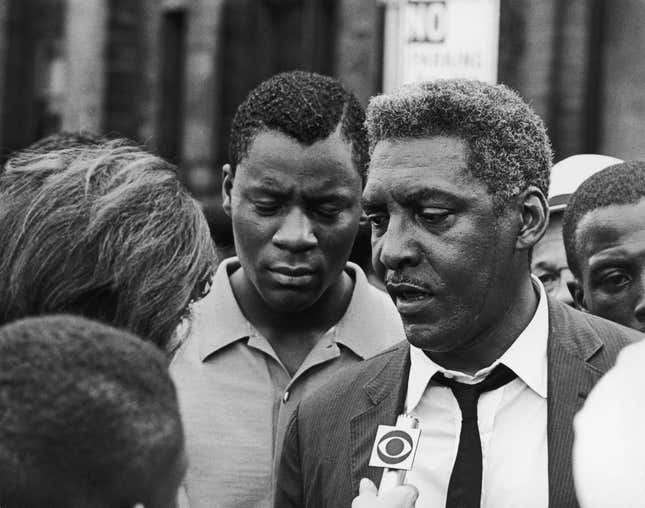
Bayard Rustin (1912-1987) Tactician of the Civil Rights Movement
Bayard Rustin was Martin Luther King’s mentor and consigliere. As a Quaker, he laid the blueprint for King’s most enduring philosophy, that of pacifism and nonviolent resistance. Rustin also was the lead organizer of the 1963 March on Washington, where King delivered his most famous address, and had a seminal influence on CORE, the Congress of Racial Equality, which was also based on pacifist nonviolence.
Remarkably, Rustin was out his entire life, yet still faced discrimination within the black community and the larger movement for his sexuality, including a particularly painful episode where Congressman Adam Clayton Powell of Harlem wielded Rustin’s homosexuality against him and threatened MLK, who dropped him for political expediency. In the 1980s, Rustin began to advocate for gay rights, including a 1986 speech entitled, “The New Niggers Are Gays.” In 2013, President Barack Obama posthumously awarded him the Presidential Medal of Freedom, the country’s highest civilian honor.
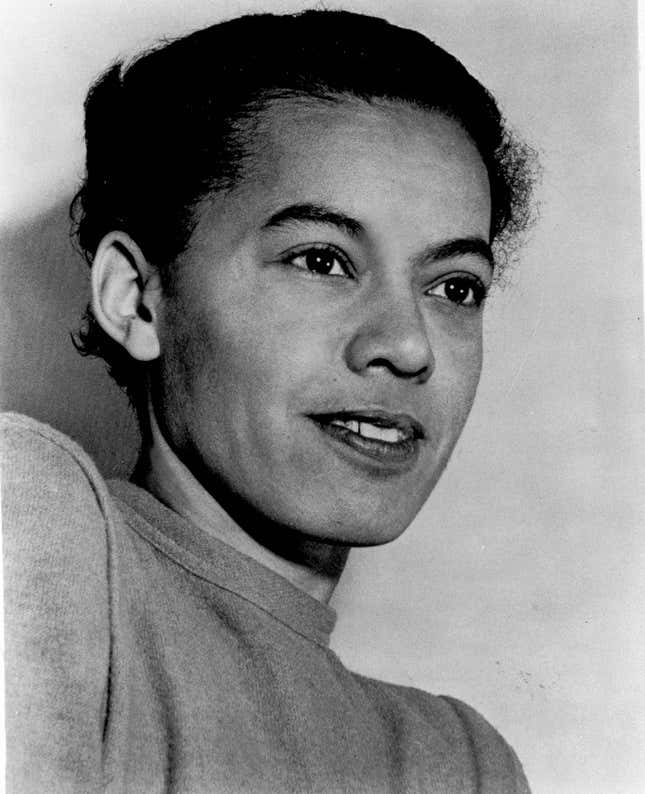
Pauli Murray (1910-1985) - A Radiant Mind Before Her Time
Anna Pauline “Pauli” Murray was a brilliant strategist and fighter for racial and gender equity. She was a lawyer with four advanced degrees, and later a professor, lecturer, and author. Murray also wore men’s clothing (a 2017 biographer classified her as trans, although she identified as a woman during her lifetime). She graduated first in her class as the only female student at Howard University Law School, where she led successful nonviolent actions against segregation in 1940s Washington, D.C. Murray also suffered from mental illness.
Nevertheless, she was a founder of the National Organization for Women (NOW) and was instrumental in crafting the theory behind Brown v. Board of Education. Through her passionate activism, Murray forged a direct line to Eleanor Roosevelt, which allowed her to weigh in on policy in FDR’s White House, especially around lynching. Murray was instrumental in planning the 1963 March on Washington, but strongly critiqued the way “Negro women” were subjugated in the Civil Rights movement. “If anyone should ask a Negro woman what is her greatest achievement, her honest answer would be, ‘I survived,’ ” she said.
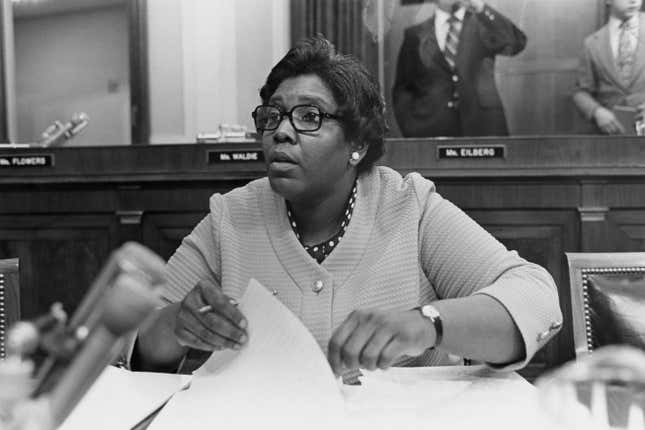
Barbara Jordan (1936-1996) - The Voice of God
In 1974, when the freshman Congressman from Texas spoke as part of the House Judiciary Committee, which adopted articles of impeachment against President Richard Nixon, she cemented herself as one of the world’s best orators. The Honorable Barbara Charline Jordan, a Baptist preacher’s daughter hailing from the Fifth Ward of Houston, captivated those in the chamber and at home with her rich, resonant voice. A champion debater since college, Jordan, who was a lawyer by training, lived a life of firsts—the first African-American to deliver a keynote address at the Democratic National Convention (1976); first black woman to serve in the Texas Senate; the first black person buried in the Texas State Cemetery.
For her entire life, Jordan remained closeted except to close family and friends, and it wasn’t until her death that her longtime partner was acknowledged. “I’m not going to Washington and turn things upside down in a day,” Jordan told supporters at a 1972 rally. “I’ll only be one of 435. But the 434 will know I’m there.”
Paris DuPree (1950-2011) - Muva of the Ball
Come on, Vogue. Yes, children, werk your body in glorious poses; stretch, create, and influence culture, while you’re at it. Paris DuPree is considered the Grand Dame/mother/supreme being of voguing, and of the ball culture which gave it life. Thanks, Madonna, but no. DuPree was founder and mother of the House of DuPree, one of the top five ball houses in the 1970s (fellow mothers: Angie Xtravaganza, Dorian Corey, Avis Pendarvis and Pepper LaBeija) whose annual ball, “Paris Is Burning,” inspired the documentary of the same name, which brought the world this rich subculture.
The House of DuPree’s first ball was in 1981, and is credited with pioneering what are now known as “categories,” including “Butch Queen,” which DuPree famously alluded to in Paris is Burning: “That’s right! I said it! Butch queen! Boy in the day, girl at night!” A whole new generation is now familiar with that ball scene thanks to FX’s Pose, but respect must be given where it is due—to those who paved the way and originated the art form.
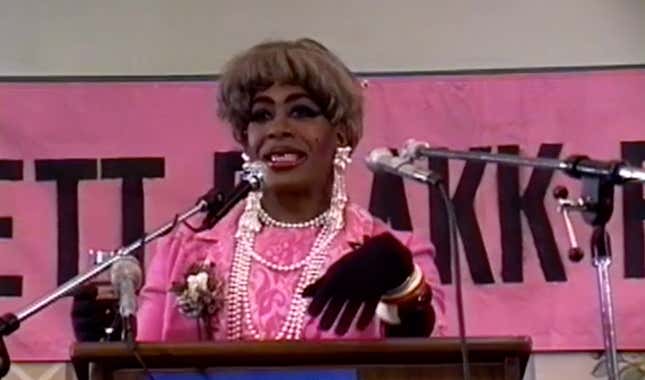
Joan Jett Blakk (1956-present) - Dragging Politicians Everywhere
Joan Jett Black is a persona, yes—“two t’s, two k’s”—but that doesn’t make the crux of what she’s done any less compelling, riveting, amazing. Blakk, a drag queen alter ego of Terence Smith (also of Pomo Afro Homos fame), made her world debut in 1974, and in 1991, ran against Chicago Mayor Richard M. Daley. The next year, Ms. Blakk ran for president of these entire United States on the Queer Nation Party platform, and challenged presumptive nominee Bill Clinton to a debate at the Democratic National Convention in New York City, “If a bad actor can be elected president, why not a good drag queen?” she asked.
At a time where HIV and AIDS were decimating the black and gay community, separately and together, Blakk used her voice to speak truth to power, consistently putting the issues and needs of gay, black and marginalized people at the fore. “You can watch the news and never hear the word ‘gay’ mentioned,” Blakk said. “That just unnerves me. But with this campaign, they’ll have to say the word; I’ll make them.” Joan Jett Blakk is now the subject of a play currently running at Chicago’s Steppenwolf Theatre, Ms. Blakk for President, written by Oscar-winning screenwriter Tarell Alvin McCraney, of Moonlight fame.
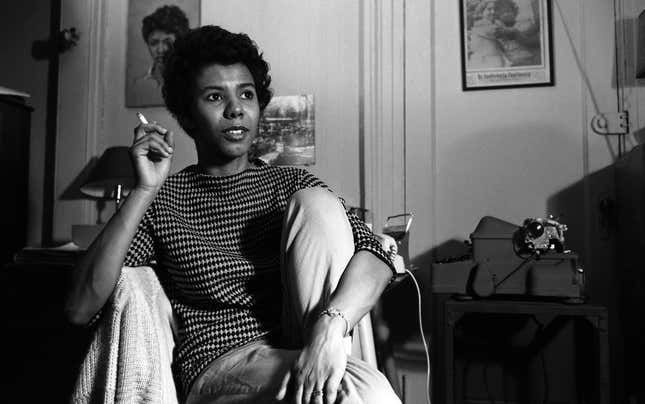
Lorraine Hansberry (1930-1965) Young, Gifted & Gay
Lorraine Hansberry was a prolific writer, playwright, activist, and the writer of the first play by a black woman to be produced on Broadway, who died far too young. At the age of 29, she won the New York Drama Critics’ Circle Award—making her the first African American dramatist and the youngest playwright to do so. Five years after her seminal work A Raisin in The Sun, named for a line from a Langston Hughes poem and distinguished as the first play by a black woman to go on Broadway, Hansberry was gone.
In 1963, with James Baldwin and others, Hansberry met with U.S. Attorney General Robert F. Kennedy to make a “moral commitment” to Civil Rights. After about three hours of what must have been exasperating pushback, Hansberry walked out of said meeting, and all those present followed her. Before her death at 34, Hansberry joined the NY Daughters of Bilitis as an activist in the “homophile” movement and contributed two letters to their magazine, The Ladder, under her initials, “LHN.” She often equated the struggles of the black community to hardships lesbians faced. In 1999, Hansberry was posthumously inducted into the Chicago Gay and Lesbian Hall of Fame. She was also the inspiration for friend Nina Simone’s homage to excellence: “To Be Young, Gifted and Black.”
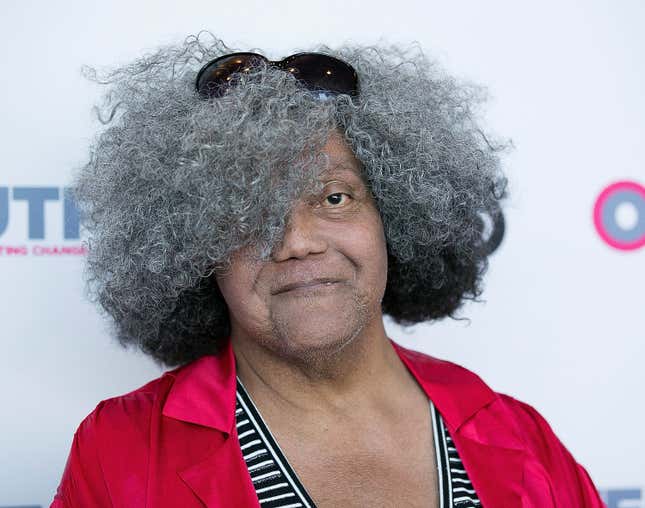
Miss Major (1940 - present) Trans Trailblazer
Miss Major Griffin-Gracy is a trans woman and activist who has been an essential player for transgender rights since the 1960s, especially for her black and brown trans sisters. Like many other erased women of color, Miss Major was at the Stonewall Riots of 1969, where she was arrested and reportedly had her jaw broken by a corrections officer while in custody. She did five years in Attica for sex work and she has fiercely advocated for the rights of trans girls and women incarcerated in men’s prisons.
Miss Major is all of the following: a prison abolitionist, an AIDS activist, and a performer, all the while calling out the racism and transphobia of the gay community. She is the founder of the Griffin-Gracy Educational Retreat & Historical Center (or the House of GG), in Little Rock, Ark., the first educational and historical site solely dedicated to transgender and gender nonconforming people in the U.S. Miss Major is also the subject of the 2016 documentary, Major! which chronicles her lifetime of right action.
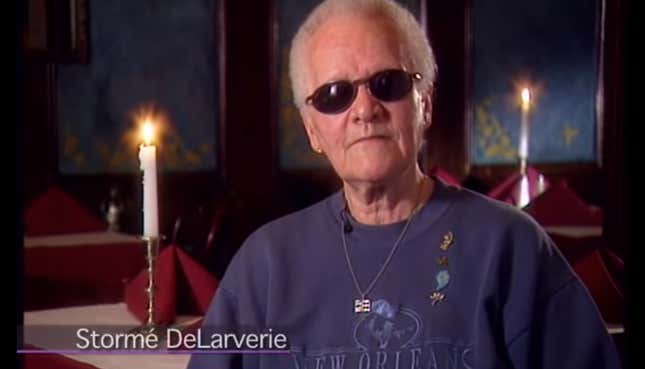
Stormé DeLarverie (1920-2014) - Rosa Parks with a Gat
Like Marsha P. Johnson and Miss Major, Stormé DeLarverie was right there at the Stonewall Inn on June 28, 1969. Folklore (and she herself) says that she threw the first punch at police. DeLaverie was one of several “butch lesbians” who fought the oppressive, prejudiced NYPD on that fateful summer night—for this, she has been dubbed the “Rosa Parks of the Gay Rights Movement.”
Before Stonewall, DeLarverie was the MC (and only drag King) of the Jewel Box Review, which played at the legendary Apollo Theater to integrated audiences, a rarity during the 50s and 60s. DeLarverie was also a fixture in the Gay Pride parade for years, and a bouncer at many lesbian bars and clubs in New York City’s Greenwich Village, packing a legal gun (until she was 85) to protect against those who would do the gay community harm. The subject of at least two documentaries, including Stormé: The Lady of the Jewel Box and Storme, DeLarverie was honored by the city of New York for her fearless life in 2014.
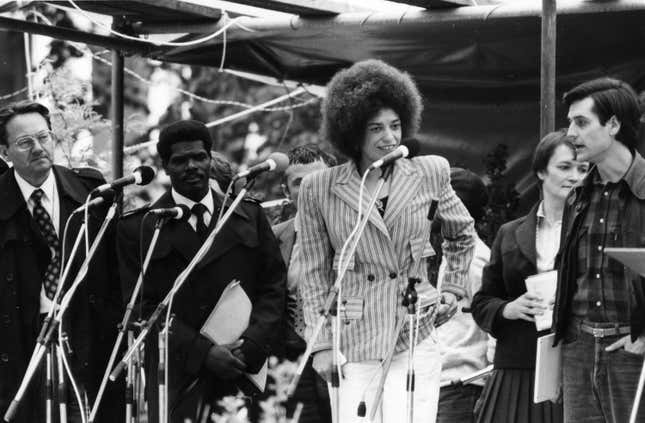
Angela Davis (1944-present) - Free Angela
Angela Y. Davis is one of our most revered and dyed-in-the-wool freedom fighters, authors and teachers. Bathed in the fire of Birmingham, Ala., where she was raised (her neighborhood was called “Dynamite Hill” for all of the bombings it endured), Davis not only has been fighting against racism, classism, sexism, and prison reform since forever, she herself has been jailed (on murder charges in 1969), and founded Critical Resistance, dedicated to crushing the Prison Industrial Complex.
Davis has always had a penetrating mind, and is now professor emerita at the University of California, Santa Cruz, and a former director of the university’s Feminist Studies department (in 1969, she successfully triumphed over then Governor of California Ronald Reagan when he tried to fire her for her membership in the Communist party). In 2018, she donated her papers to Harvard’s Schlesinger Library at Harvard University’s Radcliffe Institute for Advanced Study. In 1997, Angela Y. Davis came out as a lesbian, making her slogan, “Free Angela,” even more apropos.
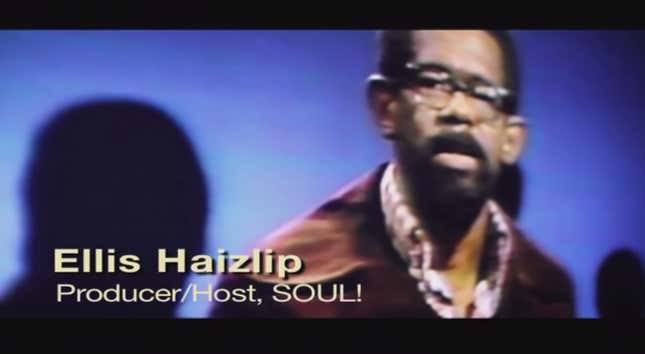
Ellis Haizlip (1929-1991) - Soul Man
Ellis Haizlip was a pioneer in content creation and the first black producer at a PBS Station in New York, WNET (then WNDT), where he created Soul!, a trailblazing television show that explored the breadth of black culture, during an especially fraught time of social upheaval and unrest. It was considered “The Black Tonight Show” and featured such luminaries as Muhammad Ali, Sidney Poitier, Cicely Tyson, James Baldwin, Harry Belafonte, Maya Angelou, Donny Hathaway, Ossie Davis, Ruby Dee, and Patti Labelle.
In its run from 1968-1973, Soul! not only showed black brilliance in front of the camera but employed a majority of African Americans behind the scenes. A native Washingtonian, Haizlip attended Howard University, and after graduating in 1954, he landed in Harlem, where, during the 1950s, he began producing plays at the Harlem Y.M.C.A. including Dark of the Moon, with Cicely Tyson, Clarence Williams, Isabel Sanford, Calvin Lockhart, James Earl Jones and the Alvin Ailey Dancers. The last episode aired on March 7, 1973. Though he was never out, Haizlip challenged black leaders such as Louis Farrakhan on Soul! about the Nation of Islam’s stance on gays and lesbians. A documentary, Mr. Soul!, premiered in 2018, with the tagline: “Before Arsenio, Before Oprah, There was Mr. Soul!”
Editor’s Note: For more black, pioneering, notable LGBTQ folk of African descent, check out the Ubuntu Biography Project, created by Stephen A. Maglott (1953-2016).

